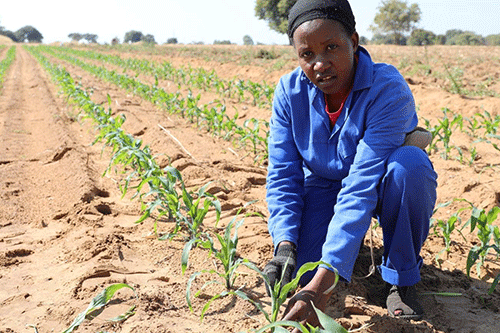John Muyamba
RUNDU – Agriculture minister Calle Schlettwein has said suggestions made by the leaderships of the two Kavango regions will be looked into, but there is a need to discuss conditions about outsourcing and leasing.
“Those conditions are the ones that we need to have an agreement on – not who runs the farms then we have an agreement and understanding how we manage that system,” he said.
Schlettwein made these remarks during an engagement with the Kavango West and Kavango East regional councils and traditional authorities in Rundu on Monday.
The traditional authorities argued locals have not benefited, while regional councils noted the green schemes collapsed due to a lack of supervision from the region.
In March this year, government announced it would issue a request for proposals to lease 11 green schemes.
During the discussions, chairperson of the Kavango West Regional Council Joseph Sivaku asked the minister to put on hold the procurement process regarding the outsourcing of the green schemes until they had exhausted their deliberations with him.
“We gave land to government to develop green schemes to uplift our communities but our people and children have not benefited – all we see is just people coming from far, and the immediate community that gave their crop fields are suffering and are mistreated by the tenants leasing these projects. Is that really fair?” said Festus Shikerete, senior traditional councillor of the VaGciriku Traditional Authority.
“Our children are not even getting employment opportunities from the land we gave with the hope to make a difference in our villages. We gave the land for free but they are benefiting people who aren’t from here – and they, in turn, laugh at us that we surrendered our land but we are the poorest,’’ Shikerete added.
“Even if we see that things aren’t going well, we have no power to step in. Now how will government empower us to make sure we have that power to monitor and intervene when things are not going well,” said Nkurenkuru constituency councillor Fillipus Tenga.
On 27 May this year, the leadership of the two regions drafted a letter to the minister, requesting his audience on the revitalisation of the green schemes.
In the letter, they proposed that councils take over the green schemes.
The minister responded: “Quite frankly, that would be difficult to achieve; councils are politically elected institutions. It is impossible that they just focus on creating a conducive environment policy. Legal wise, citizens have the economic opportunities – not councils. I agree a supervisory ability in the region is important; we must decide and agree on how we do that: is it through the governors, the councillors or traditional authorities?
Is it a special committee that we create to do that? So, the way we operate them must be collective effort again – no one must feel left out; we need to make sure these green schemes are bringing to us the value they are designed to bring about.”
The minister also noted the complaints from the traditional authorities and the political leadership were indeed true that locals who have not benefited must get the financial benefit and the nation gets the benefit of food security.
“Now we must take the next step; we must not repeat what went wrong. There are some good suggestions in your paper; that is how we monitor and control the projects better, and how we ensure local participation – how we roll the benefits to the locals and citizens of the region; those are the principles around which the review is hinged. Local beneficiation is top of priority that must be affected,” the minister said.
“So, basically, government said we will develop the infrastructure and then we will outsource it to the local community so that they can farm with the infrastructure that is created,” he said.
According to the minister, the initial green scheme principle was very well understood, and it was initially implemented in that manner – “but then, what crept in, I believe, is that the first round of outsourcing of these projects did not well adhere to the provisions of localising and shifting benefits to locals”.
“It was then thought that if this model does not work, government must create its own entity, called Agribusdev, to outsource these projects but supervise this outsourcing better so that we make sure localisation is taken care of and regional benefits are covered,’’ he said.
Schlettwein further highlighted that Agribusdev, instead of supervising and outsourcing to private sector partners, decided to run green schemes as their own farms and manage them from the head office in Windhoek.
The result was a complete failure.
“After consulting the regions’ traditional authorities that Agribusdev is not the right model to manage farms, we went to Cabinet that we should withdraw Agribusdev as the manager of the farms, take it back to the agriculture ministry and revert to the old green scheme policy,” he noted.
Sivaku called on the minister to give the leadership timely feedback, saying he replied to their letter only after two months.
Schlettwein did not take this comment lightly and reminded the leadership that he too wrote them a letter in which he asked them to provide him with material on communal land administration two years ago but he has not received a response.
The minister called on the regional leadership to first clean their house before calling him.
Schlettwein said among the green schemes in the two Kavango regions, only Musese (Kavango West) and Mashare (Kavango East) survived the outsourcing to the private sector.
Shitemo (Kavango East) did not survive, while the ones that were run by Agribusdev collapsed, namely Ndonga Linena, Shadikongoro and Uvhungu-Vungu in Kavango East.
Sikondo in the Kavango West is doing reasonably well.



